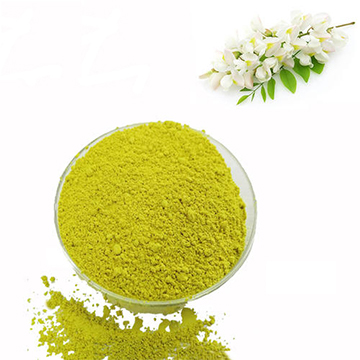

Rutin, a natural citrus bioflavonoid, is extracted from the dry buds of sophora japonical.
Rutin is a tasteless, yellow or greenish yellow crystalline powder that becomes plastic when heated between 185°C and 192°C and discomposed at 215°C.which is practically insoluble in water while soluble in methanol and ethanol. It is a naturally occurring pigment. Rutin is classified as vitamin p which increases the strength of the walls of the blood capillaries and regulates their permeability. Others classified as vitamin p are catechin, citrin, eriodictin, hesperetin, hesperidin, nobiletin, quercetin,sinensetin, and tangeretin.
1. Rutin may modulate the respiratory burst of neutrophils;
2. Rutin is a phenolic antioxidant and has been demonstrated to scavenge superoxide radicals;
3. Rutin can promotes circulation, stimulate bile production, help to lower blood cholesterol,and prevent cataracts;
4. Rutin is a bioflavonoid. It can enhance the absorption of Vitamin C; help to relieve pain, bumps and bruises and has an antibacterial effect;
5. Rutin can chelate metal ions, such as ferrous cations. Ferrous cations are involved in the so-called Fenton reaction, which generates reactive oxygen species.